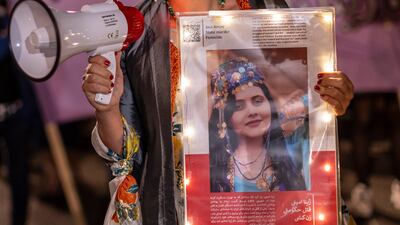Iran has hit out at western nations over what it called their “illegal” decision to impose more sanctions on the country.
The US, Britain and the EU announced sanctions on Iranian individuals and entities on Friday, the eve of the first anniversary of Mahsa Amini's death in police custody.
Iran's Foreign Ministry spokesman Nasser Kanaani criticised the western countries' “illegal and undiplomatic actions” in a statement on Friday.
He warned European diplomats against “unconstructive behaviour” which “does not serve their interests”.
The latest US sanctions added 25 Iranian officials, three media outlets and an internet censorship company to their blacklist, saying all were linked to Tehran's suppression of protests after Ms Amini's death.
On Saturday, Iranian security forces briefly arrested and then released Ms Amini's father, and warned him against marking the anniversary, a human rights group said.
“Security forces detained Amjad Amini today and returned him to his house after threatening him against marking his daughter's death anniversary,” the Kurdistan Human Rights network said.
Iranians at home and abroad marked the anniversary on Saturday, with campaigners speaking of renewed action by the regime to prevent any resurgence of the protests which rocked major cities last year.
Ms Amini, a 22-year-old Iranian Kurd, died a few days after her arrest by religious police for allegedly disobeying the strict dress code for women in force since shortly after the 1979 Islamic revolution.
Her family said she died from a blow to the head, but this is disputed by Iranian authorities.
Anger over her death became weeks of protests where women removed or refused to wear mandatory headscarves in an open challenge to the country's system of government under supreme leader Ayatollah Ali Khamenei and his predecessors.
But after several months, they lost momentum as security forces killed 551 protesters, according to Norway-based Iran Human Rights (IHR), and arrested more than 22,000, according to Amnesty International.
Iranian authorities said dozens of security personnel were killed in what they describe as riots incited by foreign governments and hostile media.
Seven men have been executed after being convicted in protest-related cases.
Saeid Deghan, lawyer for dual nationals including British-Iranian Nazanin Zaghari-Ratcliffe, said on social platform X, formerly Twitter, that Iranian authorities have prevented the bodies of three dual nationals recently executed from leaving the country, without giving details on their identities.
Campaigners said the authorities had renewed their crackdown in the run-up to the anniversary, putting pressure on relatives of those killed in the protests to stop them speaking out.
New York-based Human Rights Watch said family members of at least 36 people killed or executed in the crackdown had been interrogated, arrested, prosecuted or sentenced to time in prison over the past month.
“Iranian authorities are trying to impose a chokehold on dissent to prevent public commemoration of Mahsa Jina Amini's death in custody, which has become the symbol of the government's systematic oppression of women, injustice and impunity,” said HRW's senior Iran researcher, Tara Sepehri Far.
The two journalists who did the most to publicise the Amini case – Niloufar Hamedi and Elahe Mohammadi who respectively reported from her hospital and funeral – have been held in prison for almost a year. Another reporter, Nazila Maroufian who interviewed Amjad Amini, has been arrested repeatedly.
Mr Amini has told Persian media based outside Iran that he planned to hold a commemoration for his daughter in their hometown of Saqez in Kurdish-populated western Iran on Saturday.
Outlets, including Prague-based Radio Farda, said he was summoned by intelligence officials after his announcement. He was not arrested, but one of Amini's uncles, Safa Aeli, was detained in Saqez on September 5.
According to Kurdish-focused news outlet Hengaw, the government has sent additional security forces to Saqez and other towns in western Iran that could become flashpoints.
Chair of the UN fact-finding mission investigate the crackdown
While some women are still seen walking in public without headscarves, particularly in wealthy, traditionally liberal areas of north Tehran, the conservative-dominated parliament is considering a draft law that would impose far stiffer penalties for non-compliance.
“The Islamic republic is doubling down on repression and reprisals against its citizens and seeking to introduce new and more draconian laws that severely restrict further the rights of women and girls,” said Sara Hossain, the chairwoman of the UN fact-finding mission set up to investigate the crackdown.
Under the slogan Say Her Name!, Iranian emigres were expected to hold commemorative rallies, with large demonstrations expected in Paris and Toronto.
Amnesty International accused Iran's authorities of committing a “litany of crimes under international law to eradicate any challenge to their iron grip on power” and lamented that not a single official had been even investigated over Mahsa Amini's death or the crackdown.
“The anniversary offers a stark reminder for countries around the world of the need to initiate criminal investigations into the heinous crimes committed by the Iranian authorities under universal jurisdiction,” said Amnesty's Middle East and North Africa deputy director, Diana Eltahawy.












